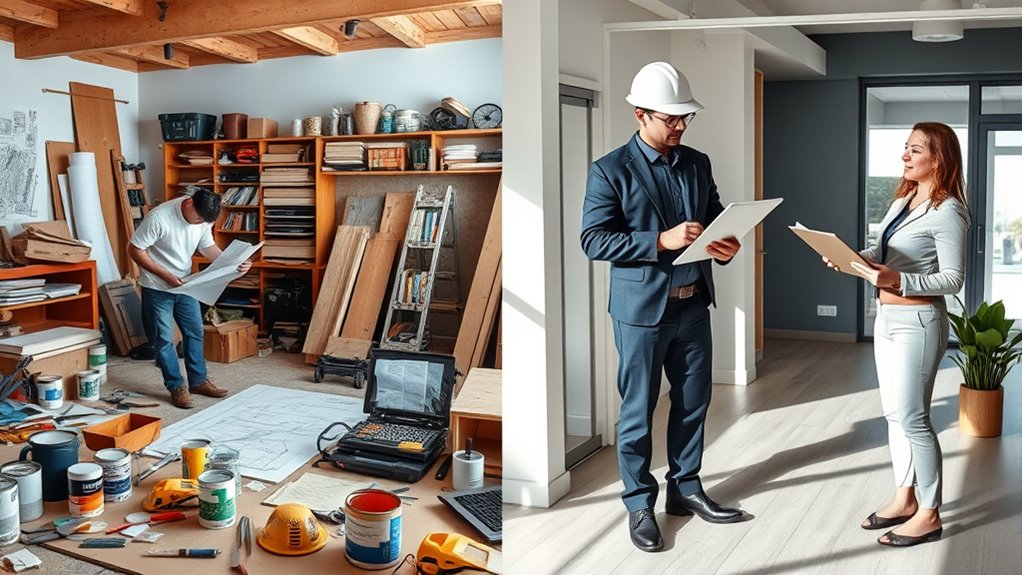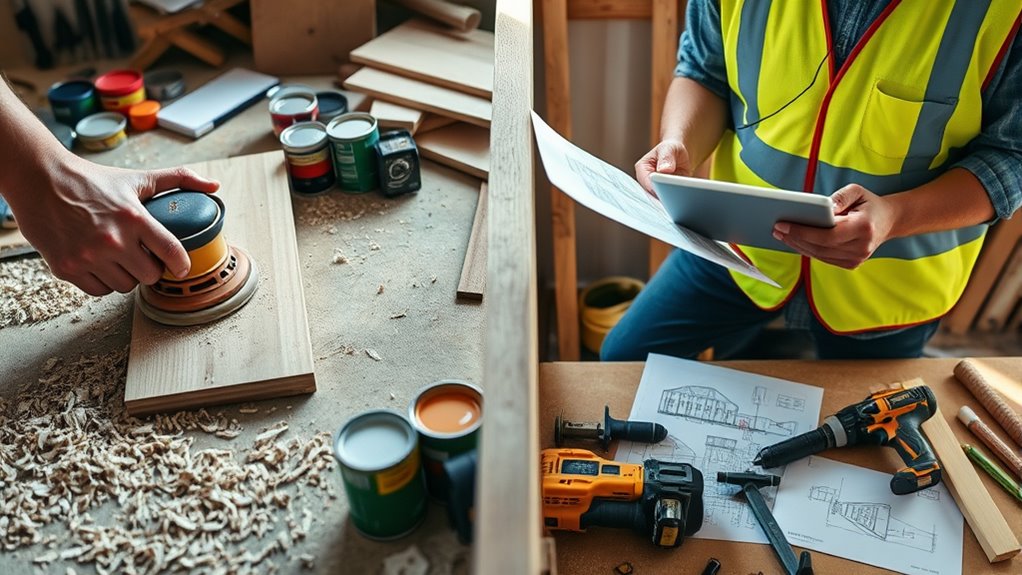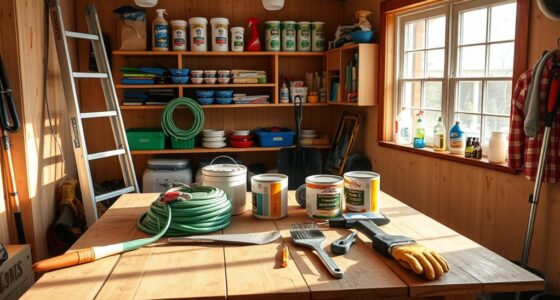When deciding whether to DIY or hire a contractor, consider your project’s complexity, your skills, and your timeline. Simple tasks like painting might be manageable yourself, saving money, but complex jobs like electrical or plumbing need professional expertise for safety and quality. Weigh costs, risks, and regulatory requirements to determine the best option. Keep exploring to uncover more about how to make the right choice for your project.
Key Takeaways
- Assess your skill level and project complexity to determine if DIY is feasible or if professional expertise is necessary.
- Compare costs, including potential hidden expenses and time investment, to decide which option offers better value.
- Consider safety, permits, and compliance requirements, favoring professionals for complex or regulated tasks.
- Evaluate your availability and project timeline; professionals often complete projects faster, reducing stress.
- Weigh the quality and durability of results, opting for professionals when high standards and safety are priorities.

When deciding whether to tackle a home project yourself or hire a professional, you need to weigh the benefits and drawbacks of each option carefully. One of the first things to consider is the cost comparison. Doing it yourself might save you money on labor, but it can also lead to unexpected expenses if mistakes happen or if you need to buy specialized tools. On the other hand, hiring a contractor typically involves higher upfront costs, but it often results in a smoother process and a finished product that meets quality standards. It’s important to honestly evaluate whether the savings of a DIY approach outweigh the potential costs of errors or delays.
Weigh the costs and benefits of DIY versus hiring a pro carefully before starting your home project.
Skill requirements play a vital role in this decision. Some projects are straightforward and can be completed with basic skills, like painting or installing simple shelving. If you have some experience or are willing to learn, you might find that DIY is feasible and rewarding. However, complex tasks such as electrical work, plumbing, or roofing demand specialized knowledge and expertise. Attempting these without proper skills can be dangerous, lead to subpar results, or violate local codes. Hiring a licensed contractor not only guarantees safety and compliance but also provides peace of mind that the job will be done correctly.
Beyond cost and skills, think about your timeline and availability. DIY projects often take longer, especially if you’re learning as you go or juggling other responsibilities. If you need the project completed quickly or want to avoid potential stress, a professional contractor can often finish the work faster, thanks to experience and resources. Also, consider the quality of work you desire. While some DIY enthusiasts produce excellent results, others may find that a professional’s craftsmanship elevates the final product and adds value to your home.
Additionally, understanding the importance of professional cleaning services can ensure your project area remains safe and well-maintained, especially when dealing with tasks like grout cleaning or window washing. Another aspect is liability and insurance. When you hire a contractor, they usually carry insurance that protects you from potential damages or accidents on your property. If you do it yourself and something goes wrong, you’re responsible for fixing any issues, which can be costly. Additionally, some projects might require permits or inspections, which are more easily handled by licensed professionals familiar with local regulations.
Ultimately, you need to evaluate your own skills, budget, timeline, and comfort level with risk. If the project is simple, within your skill set, and cost-conscious, DIY can be a great choice. But for complex, high-stakes, or time-sensitive jobs, hiring a professional is often the smarter, safer investment.
Frequently Asked Questions
What Are the Legal Requirements for Hiring a Contractor?
When hiring a contractor, you need to make certain they meet legal requirements like proper contractor licensing and obtaining necessary legal permits. You should verify their licensing status with your state’s licensing board and confirm they have all required permits before work begins. Doing this helps protect you from legal issues, ensures quality work, and keeps your project compliant with local regulations. Always ask for proof of licensing and permits upfront.
How Do I Verify a Contractor’S Credentials and Insurance?
You want peace of mind, so start with background checks and licensing verification. Don’t skip these steps—verify their credentials and insurance to guarantee they’re qualified and protected. While a contractor may seem trustworthy, a quick license check and proof of insurance reveal their legitimacy and coverage. It’s your safeguard against scams and subpar work, giving you confidence that your project’s in capable hands.
Can I Modify My Project Scope After Starting?
You can modify your project scope after starting, but it’s important to ensure scope flexibility and budget adjustments. Communicate your changes clearly with your contractor or team, and expect potential costs or timeline adjustments. Staying flexible helps manage expectations, but keep in mind that changes may impact your overall budget and schedule. Regular updates and open dialogue ensure your project stays aligned with your evolving needs while maintaining control over costs.
What Warranties or Guarantees Are Typically Offered?
Imagine a project where things go wrong—are you protected? Warranty coverage and guarantee terms can vary widely, so it’s essential to understand what’s included. Usually, contractors offer warranties on workmanship and materials, but the specifics differ. You should ask about the duration and what’s covered, ensuring you’re not left vulnerable if issues arise later. Knowing these details can save you from unexpected costs and peace of mind.
How Do Project Timelines Differ Between DIY and Contractors?
Your project timeline varies greatly depending on whether you DIY or hire a contractor. When you do it yourself, you control the project scheduling, offering more timeline flexibility but risking delays if you’re inexperienced or unavailable. Hiring a contractor typically results in a more structured schedule, with clear deadlines, but less flexibility. Contractors often have multiple projects, which can affect your timeline, while DIY projects depend on your pace and commitment.
Conclusion
Ultimately, deciding whether to DIY or hire a contractor depends on your skills, budget, and project scope. Did you know that homeowners who hire professionals complete projects 30% faster on average? If you’re confident in your abilities and want to save money, DIY might be the way to go. But for complex tasks, hiring a pro guarantees quality and safety. Weigh your options carefully to make the best choice for your project’s success.










